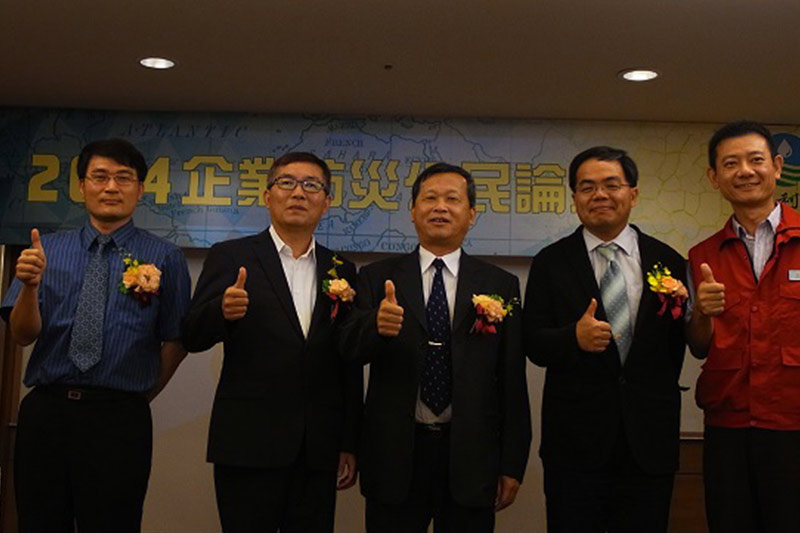Ta Ya Discusses Corporate Social Responsibility Practices at 2014 Corporate Disaster Prevention Public Forum

2014/06/03
In an attempt to raise the public's awareness of disaster prevention and form a Public Private Partnership (PPP), the Water Resources Agency has made plans to organize 3 sessions of "Corporate Disaster Prevention Public Forum" this year (2014). The first session was held on May 30 at The Grand Hi Lai Hotel, Kaohsiung. Ta Ya Electric Wire and Cable was invited to share its experience during this conference session for it has demonstrated excellent performance in terms of corporate social responsibility practice and corporate volunteers.
Deputy Director Wang Ruide of Water Resources Agency said in his welcoming speech: "The Water Resources Agency has been organizing flood control volunteers in its own capacity, but it still requires efforts from businesses to make disaster prevention a nationwide movement. We look forward to seeing businesses take on more responsibilities and engage more actively in public disaster prevention by expanding their existing business risk management practices, and work with the public sector for maximum effect. Next, Deputy Director Lai Wenji of National Cheng Kung University Disaster Prevention Research Center listed several economic and social damages caused by climate change, and used the 311 Earthquake in Japan as an example to show that the percentage of large corporations with business continuity plans (BCP) in place has increased significantly from 45% before the disaster to 75% after the disaster.
Vice President Chuang, Pa Kuei of Ta Ya's Energy & Telecom Cable Business Group responded by explaining how a business addresses the issue of climate change. For Ta Ya, the climate change strategy comprises two parts: reduction and adjustment. In terms of reduction, the company took a number of initiatives including clean production, offering of green products, and investment into the green energy industry.

Vice President Zhuang Chuang from Ta Ya (2nd from left) and Deputy Director Wang (center) hoped for more corporate social responsibility practices from businesses.
Despite Ta Ya's involvement in a low-energy consumption business, the company continues to devote attention into reducing energy and resources. Furthermore, the company organizes regular greenhouse gas inspections to evaluate its performance in this regard. In terms of green product development, Ta Ya launches environmental-friendly cables, adopts lead-free production for PVC cables, and produces tin/copper coated ribbons and bare copper ribbons that are crucial to the manufacturing of solar cells. For wind power generators, electric vehicle motors and inverter motors, Ta Ya has also introduced surge protection enameled copper wires to support their operation. As a response to the government's plan to "build solar rooftops by the millions and wind power generators by the thousands," a subsidiary named Ta Ya Green Energy Technology Co., Ltd. was founded to specialize in the investment of clean, renewable energy.
In terms of adjustment, Ta Ya has paid close attention to water resource issues and constructed rain collection facilities at its factories, despite being a low water consumption business. Furthermore, the company organizes annual Green Inside Project to sponsor sustainable activities such as river protection, organic farming, low-carbon travel etc.; all of which are responses to extreme weathers. The company also encourages corporate volunteers. They were initially assigned to promote electrical safety, but starting from this year, Ta Ya is working with organizations from outside the company to further expand its efforts.
Another party invited to speak at the forum was Manager Zeng Yizheng from Everest Textile. He shared with the audience on how Everest had managed to reduce daily water consumption from 12,000 tons down to 6,000 tons, and announced Everest's goal to reach "Zero Emission by 2020." Later, in a general discussion hosted by Deputy Director Wang, both corporate representatives mentioned that support from senior management is most crucial to the success of corporate social responsibility. The process may be slow, but efforts will start showing results if we persist. The two corporate representatives also pointed out the difficulties trying to influence customers. Many branded buyers are starting to demand corporate social responsibility actions from their suppliers, but there are some that do less than their suppliers or make price the only consideration when purchasing. The government's assistance is needed in this respect. It is also the only way to establish a PPP relationship.
Deputy Director Wang summarized the morning's discussions by saying that businesses should first ensure the safety of their activities, then expand existing practices to assume greater responsibilities, helping society prevent disasters. Both Ta Ya and Everest have made good examples in this regard, and hopefully more businesses may follow their lead.

